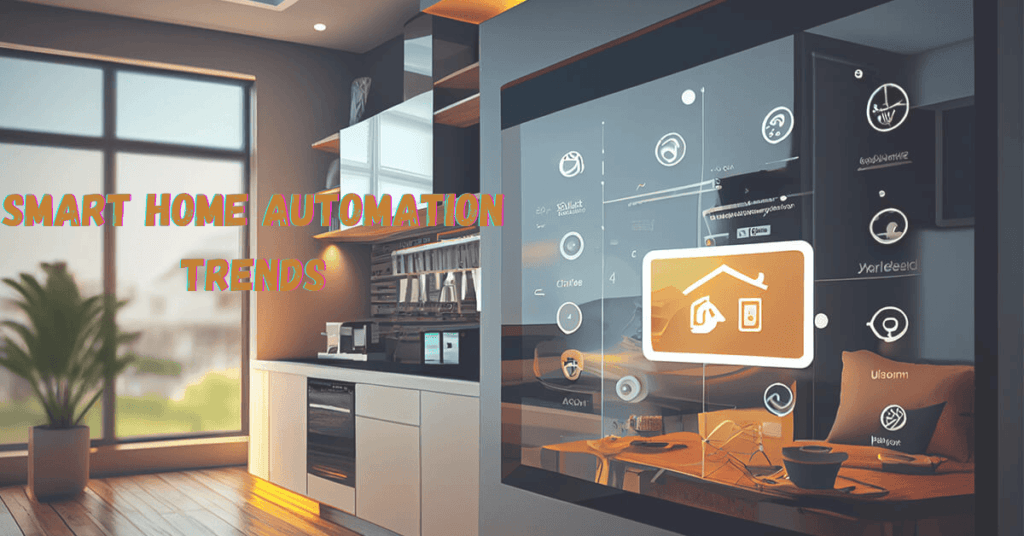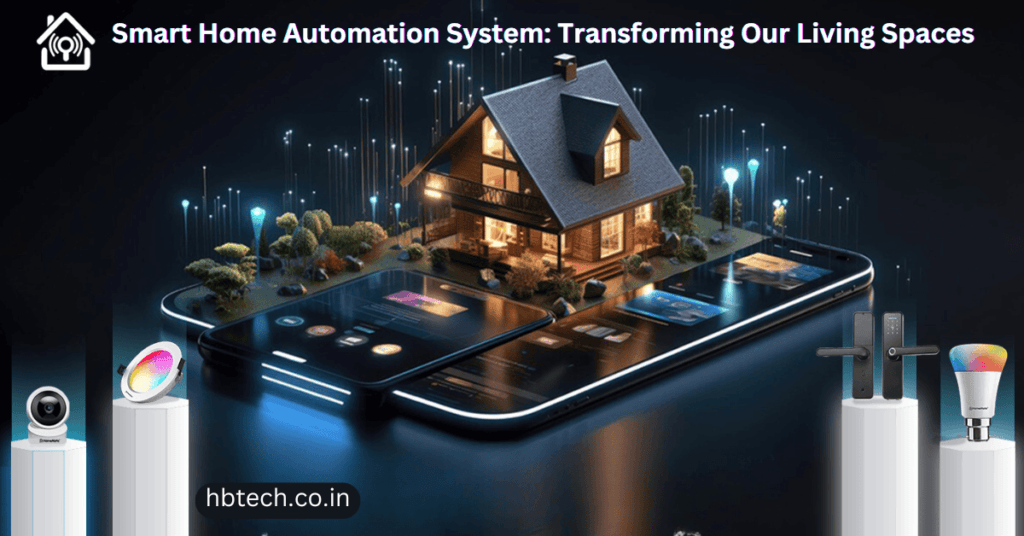Smart home automation is changing how we live by making our homes more connected and intelligent. Thanks to advancements in technology, it’s now easier than ever to control various aspects of our homes, from lighting to security, all with just a few taps on our smartphones or even voice commands. In this article, we ’ll explore the latest trends in smart home automation, how it’s growing in India and what the future holds for this technology.
What Are Smart Home Automation Trends?
Smart home automation refers to using technology to control everyday household systems like lights, security cameras, appliances and climate control. These systems work together through a network, making it easier to manage and automate tasks that were once time-consuming. The goal is to make our lives more comfortable, save energy and boost security, all while simplifying daily routines.

As technology continues to evolve, smart home automation is becoming more sophisticated, helping homeowners enjoy greater convenience, safety and efficiency. Let’s look at the current trends in this space.
Smart Home Trends in India
India is catching up with the smart home revolution, with more people looking for ways to integrate technology into their homes. Rising incomes, increased internet access,and greater awareness of smart home benefits are driving the demand for these systems.
In India, some of the most popular smart home trends include voice-controlled assistants like Amazon Alexa and Google Assistant, which allow people to manage their lights, security. , and appliances with simple commands. Smart security devices such as video doorbells, surveillance cameras , and smart locks are also gaining traction as people become more concerned about home security.
Moreover, energy-efficient solutions are becoming increasingly important, with smart thermostats and appliances helping homeowners reduce their energy bills. As India’s tech market continues to grow, we’re seeing more affordable smart home devices flooding the market, making automation accessible to a broader audience.
Top Smart Home Automation Brands
Several big brands dominate the smart home automation market, offering innovative products and solutions that make our homes smarter. Some of the most popular brands include :
- Amazon – Known for its Alexa-enabled devices like Echo and Fire TV, Amazon has revolutionized home automation by providing a wide range of smart products that integrate seamlessly with other devices.
- Google – With products like Google Home and Nest, Google offers an easy-to-use platform for controlling smart devices . Their focus on voice control and smart devices has made them a major player in the smart home space.
- Apple – Apple’s HomeKit platform allows users to control smart home devices using the Apple Home app or Siri. Their focus on privacy and security makes Apple a popular choice for those looking for reliable, secure smart home solutions.
- Samsung SmartThings – Samsung offers a variety of smart home products, from refrigerators to smart lighting. The SmartThings platform makes it easy to connect and control various devices from a single app.
- Xiaomi – An emerging brand, Xiaomi offers affordable smart home devices , such as cameras, lights , and appliances, making it a great option for those new to home automation.
These brands are making smart homes more accessible and easier to control, helping people enjoy a higher level of convenience and efficiency.
What’s Trending in Home Automation?
Smart home automation is constantly evolving, and several trends are currently dominating the market. Here are some of the most popular ones :
- Voice Control and AI Assistants: Voice-controlled devices like Amazon Alexa, Google Assistant,and Apple Siri have become an essential part of many homes . These assistants allow users to control everything from lighting and entertainment to temperature settings, all hands-free .
- Home Security Systems: Smart security devices, such as smart locks, doorbell cameras, and motion sensors, are becoming more common. These devices provide real-time monitoring and allow homeowners to check on their property remotely through their smartphones.
- Energy Management: Many homeowners are turning to smart home devices to help manage their energy use. Smart thermostats, for example, learn your preferences and adjust the temperature based on your schedule, while smart lights and appliances turn off when not in use, saving both energy and money.
- Health and Wellness Automation: With health becoming a priority for many, smart homes are incorporating devices that help improve air quality, regulate humidity, and even monitor sleep patterns. These devices aim to create healthier living environments.
Types of Smart Home Automation
Smart home automation systems can be broken down into different types based on their functionality. Some of the most common ones include :
- Lighting Automation: With smart bulbs and lighting systems, you can control your home’s lights from your smartphone. You can also schedule them to turn on or off at specific times, saving energy.
- Security Automation: Smart security systems, including smart cameras, locks. , and alarms, help keep your home safe. These systems can be controlled remotely and send alerts to your phone in case of suspicious activity.
- Climate Control Automation: Smart thermostats and air conditioners help maintain an optimal temperature in your home. These systems can adjust automatically based on the time of day, occupancy, or weather, ensuring comfort while reducing energy usage.
- Entertainment Automation: Smart TVs, sound systems, and streaming devices can be integrated into a smart home system for a more convenient entertainment experience. Voice assistants let you control these devices without lifting a finger .
- Appliance Automation: From refrigerators to washing machines, smart appliances can be programmed to operate according to your preferences, making household chores easier and more efficient.
Smart Home Automation Market Growth
The smart home automation market is growing rapidly as more people seek to make their homes smarter and more efficient . Globally, the market is expected to reach billions of dollars in the coming years. In India, the market is also expanding, driven by rising disposable incomes, greater internet access and a growing interest in energy-efficient solutions .
As more affordable devices become available, smart home automation is becoming accessible to a wider range of people, making it a hot market for both established and emerging companies.
About Smart Home Automation
At its core, smart home automation refers to integrating technology into the home to make everyday tasks easier, more efficient and more convenient. Whether it’s controlling the lights, adjusting the temperature, or securing your home, smart home systems allow users to manage these tasks from a smartphone, tablet, or voice assistant. These systems make life more comfortable while helping homeowners save energy and increase security .
Smart Home Automation Companies Leading the Way
Many companies are driving innovation in the smart home space. In addition to major players like Amazon, Google, and Apple, smaller companies are also making a mark by offering specialized solutions for security, energy efficiency, and home comfort. Notable smart home companies include :
- ADT Inc. – A leader in home security, ADT offers smart security systems that can be integrated with other smart home devices .
- Ring – Acquired by Amazon, Ring is famous for its video doorbells and security cameras, which work seamlessly with Alexa devices.
- Lutron Electronics – Specializing in lighting and shading automation, Lutron offers smart solutions for both residential and commercial spaces.
- Vivint – Known for its smart home security systems, Vivint offers an all-in-one solution that includes home automation and security features.
These companies are pushing the boundaries of what’s possible with smart home automation, creating more convenient, secure, and energy-efficient living environments.
Smart home automation is transforming the way we live, making our homes more efficient, comfortable , and secure. As new technologies continue to emerge, smart homes are becoming more accessible and affordable, allowing more people to benefit from this technology. In India, the adoption of smart home devices is on the rise, offering homeowners new ways to improve their lives. Whether it ’s through voice assistants, energy management systems or security devices, smart home automation is reshaping how we interact with our living spaces. As the market continues to grow, we can expect even more innovative solutions to emerge, making our homes smarter than ever before.
Frequently Asked Questions(FAQs)
What is smart home automation?
Smart home automation refers to the integration of technology into household systems, such as lighting, security, climate control, and appliances, to allow remote control and automation. It makes daily tasks easier, improves energy efficiency, and enhances security and comfort in your home.
What are some of the most popular smart home trends in India?
In India, smart home trends include the use of voice-controlled assistants like Amazon Alexa and Google Assistant for controlling lights, security systems, and appliances. Smart security devices such as video doorbells, smart locks, and surveillance cameras are also gaining popularity. Additionally, energy-efficient solutions, like smart thermostats, are becoming more common.
Which brands are leading the smart home automation market?
Some of the top smart home automation brands include:
Amazon (Alexa-enabled devices like Echo and Fire TV)
Google (Google Home and Nest)
Apple (HomeKit platform and Siri-controlled devices)
Samsung SmartThings (Smart appliances and devices)
Xiaomi (Affordable smart home products)What are the most common types of smart home automation systems?
The most common types of smart home automation systems are:
Lighting Automation: Smart bulbs and lighting systems that can be controlled remotely.
Security Automation: Smart cameras, locks, and motion sensors for enhanced home security.
Climate Control Automation: Smart thermostats and air conditioning systems for temperature regulation.
Entertainment Automation: Smart TVs, sound systems, and streaming devices that can be controlled hands-free.
Appliance Automation: Smart appliances like washing machines and refrigerators that can be scheduled and controlled remotely.









